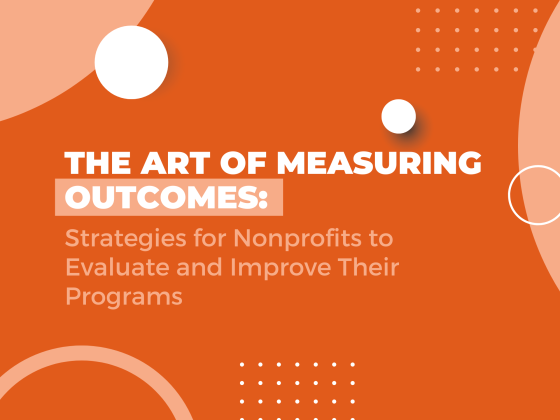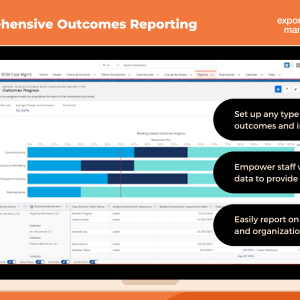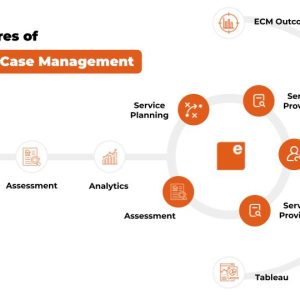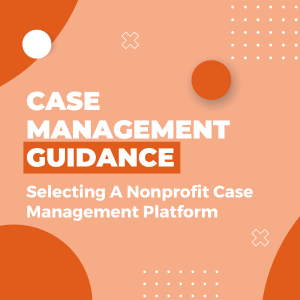The Art of Measuring Outcomes: Strategies for Nonprofits to Evaluate and Improve Their Programs
As a nonprofit organization, it’s often difficult to measure the impact and success of your programs and services. Without a clear understanding of the outcomes, it can be difficult to secure funding or make improvements to better serve your target population.
This lack of clarity can lead to frustration and uncertainty, as nonprofit leaders are left questioning whether their efforts are truly making a difference. Without accurate data, it’s impossible to make informed decisions or identify areas that need improvement.
Fortunately, there are strategies that can help. By implementing effective outcome measurement techniques, your organization can gain a better understanding of its programs’ impact and make data-driven decisions to improve its services. In this article, we’ll explore the art of measuring outcomes, provide tips, and recommend tools for nonprofit organizations looking to evaluate their program effectiveness.
What Are Key Nonprofit Outcome Metrics, And Why Do They Matter?
Nonprofit outcome metrics are crucial metrics that help nonprofit organizations measure their success in achieving their mission. These metrics help nonprofits determine if they are making a meaningful impact on the people they serve and if they are using their resources efficiently to achieve their mission.
Potential donors may want to see data-backed metrics to know if the nonprofit they are considering donating to is reputable, trustworthy, and efficient. After all, they’ll want to be able to see the impact of their donations.
Key outcome metrics will vary depending on the program or service being offered, but some common ones include the following:
Attendance Or Participation Rates
This metric measures the number of people who attend or participate in your program or service.
Knowledge Gain
Measures the amount of knowledge gained by participants through your program or service.
Behavior Change
Measures the extent to which participants have changed their behavior as a result of your program or service.
Satisfaction
Measures participants’ satisfaction with your program or service.
These metrics matter because they provide concrete evidence of the impact your program or service is having on your target population. By tracking these metrics over time, you can identify trends and make improvements to your program or service accordingly.
How To Determine The Program Outcomes You Want To Measure
Before you can measure outcomes, you need to determine what you want to measure. This involves setting clear goals and objectives for your program or service. Start by asking yourself: What do we hope to achieve through our integrated case management? What changes do we want to see in our target population? Once you have identified your goals, you can then determine what outcomes to measure.
It’s important to involve all stakeholders in this process, including program staff, participants, and funders. By doing so, you can ensure that everyone is on the same page and that the outcomes being measured are relevant, meaningful, and achievable.
Benefits Of Measuring And Tracking Outcomes For Nonprofit Organizations
Measuring and tracking outcomes provides numerous benefits for nonprofit organizations, including:
Demonstrating Accountability
Measuring and tracking outcomes shows funders and stakeholders that your organization is committed to delivering quality programs and services.
Improving Program Effectiveness
By measuring outcomes, you can identify what’s working well and what’s not, and make improvements to your programs and services accordingly.
Enhancing Program Design
Measuring outcomes can help you design programs that are more effective and efficient, and that better meet the needs of your target population.
Securing Funding
Outcome data can be used to demonstrate the impact of your programs and services, which can help you secure funding from donors and funders.
How To Measure And Evaluate Program Outcomes
Here are some steps to help you measure and evaluate program outcomes effectively:
- Develop clear goals and objectives for your program or service.
2. Identify the outcomes you want to measure and determine the appropriate metrics for each.
3. Collect data on these metrics through surveys, interviews, focus groups, or other methods.
4. Analyze the data to determine whether or not your program is achieving its goals and objectives.
5. Use the results to make informed decisions about program design and improvement.
Best Practices For Measuring Outcomes In Nonprofit Organizations
If you’re looking to improve your nonprofit’s ability to measure outcomes, the following guidelines are a great place to start:
Be Consistent
It is important to be consistent in your measurement methods and to use the same metrics over time to ensure comparability. Outcome measurement is an ongoing process that requires continuous improvement and adaptation to ensure the best possible outcomes.
Communicate Results
Communicate the results of your outcome measurement to stakeholders, including funders, board members, and program participants. This helps to demonstrate your impact and build trust with your stakeholders.
Involve Program Participants And Other Stakeholders In The Outcome Evaluation Process
Involving program participants and other stakeholders in the evaluation process is crucial for ensuring that the outcomes being measured are relevant, meaningful, and achievable. Here are some ways to involve them:
- Conduct pre- and post-program surveys to gather feedback on participants’ experiences and outcomes.
- Hold focus groups or interviews with participants to gather more in-depth information.
- Engage staff and volunteers in the outcome measurement process to ensure their buy-in and support.
- Share outcome data with stakeholders to demonstrate the impact of your program or service.
Continuously Monitor And Evaluate Your Programs
Regularly analyze and assess your outcome data to inform program design and improvement. This way, you can also ensure that they remain relevant and effective in addressing the needs of your target population. Based on the results of your analysis, you may need to adjust your program or service to improve outcomes.
Tools And Methods To Assess Program Outcomes For Nonprofits
There are several tools and methods available to assess program outcomes for nonprofits. Here are some of the tools you can take advantage of:
Surveys
These can be conducted online, by phone, or in person, and can gather information on a variety of outcome metrics.
Interviews
These can be conducted one-on-one or in focus groups, and can provide more in-depth information on participants’ experiences with your program or service.
Observations
This involves directly observing participants to gather data on behavior change or other outcome metrics.
Automated Reports
These can be generated using software tools to provide real-time data on program outcomes.
Challenges In Effectively Measuring Outcomes In Nonprofit Organizations
Measuring outcomes is critical for nonprofits to track their progress and demonstrate their impact. However, this process poses several challenges for organizations. Let’s take a look at the main obstacles that nonprofit organizations encounter when evaluating their progress toward their goals:
Limited resources
Many nonprofits have limited resources to devote to outcome measurement, which can make it difficult to collect and analyze data effectively.
Lack of expertise
Outcome measurement requires specialized skills and knowledge that may not be present in all nonprofit organizations.
Resistance to change
Some staff members or stakeholders may be resistant to the idea of outcome measurement, seeing it as an unnecessary burden or an invasion of privacy.
Difficulty in measuring intangible outcomes
Some outcomes, such as improved self-esteem or increased community engagement, can be difficult to measure using traditional methods.
Limited participant engagement
Participants may not be willing or able to provide the necessary feedback or data, which can limit the effectiveness of outcome measurement.
Lack of standardized metrics
There is no universal set of metrics or standards for measuring outcomes in nonprofit organizations, which can make it challenging to compare results across programs or services.
How can Exponent Case Management help?
At Exponent Case Management, we believe that outcome measurement is essential for improving program effectiveness, securing funding, and demonstrating accountability.
Our software solution is specifically designed to make outcome measurement easy and effective for nonprofits of all sizes. It includes robust outcome measurement tools that make it easy to collect, track, and analyze data on program outcomes. With Exponent Case Management, you can customize your outcome metrics, collect data using a variety of methods, and generate real-time reports to inform decision-making.
We’re here to help you make a real difference in the world, one outcome at a time. Watch our demo to find out more or contact us if you have questions.




